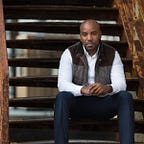Why Racial Justice Work Matters
When I turned 16, my parents bought me my first vehicle. While getting a car was a celebratory moment for a 16-year-old young man, I quickly noticed how my parents would wait up every night until I came home from work, spending time with friends, or after-school activities. At the time, I thought it was simply my parents being overprotective; I later found out this act was the daily stress caused by concern for my safety. You see, I’ve personally had a fascinating history with traffic stops. Over the years, I have been stopped by police 17 times. Of the 17 times I was stopped, I have only received two tickets, one for a seat belt violation (I was wrong), the other for an expired insurance card (I had the old card in the car). I always question what I did wrong with each stop. The last one happened in 2020 on Columbus Drive when I was headed to meet my team at a retreat in Lincoln Park. I was asked how I could afford the car I owned before being released with no violation. These interactions have come to cause me a bit of emotional distress every time I see lights flashing while driving. As a 40-year-old man, I now share the same concern my parents had for my nephew and every one of our Scholars who are out on the road.
I want to start by saying I don’t think all police are bad people. I think that’s an important statement to make. I have many friends and family members who serve and are trying to create positive change in our city; however, something is broken within the system. This is why ecosystems change and equity for young men of color remain core priorities for Chicago Scholars. We need to start talking about and addressing the underlying structural inequities that are damaging our society. This is why racial justice is a part of Chicago Scholar’s READI work (Racial Justice. Equity. Accessibility. Diversity. Inclusion) We have now seen young black men and women lose their lives for driving away (Daunte Wright), for selling loose cigarettes on the street (Eric Garner), for owning a legal firearm (Philando Castile), for playing with a toy gun (Tamir Rice) and sadly I could go on and on and on.[BM1]
This message is not meant to be political. But every day, Chicago Scholars face racism on their college campuses and in their companies. I feel that it’s my responsibility to bring light and awareness to what black people are experiencing and the trauma Chicago Scholars are dealing with while succeeding in their leadership journeys. Because in spite of all the trauma and pain, Chicago Scholars ARE thriving — but just imagine how much more they could be accomplishing if we eliminated the racism in their ways.
I know many of you are probably tired of having to read messages like this. Frankly, I’m tired of writing them. While I don’t know all the details of what happened to Daunte Wright the other night, we can all agree that it didn’t have to end the way it did. With each new video of an unarmed person of color being killed by law enforcement, it deepens a wound that has far from healed. Freedom, justice, safety, and the right to live should not be solely afforded based on the color of one’s skin or privileged identity. We must be a voice for the marginalized. We must stand for justice and equity. Education, opportunity, leadership, and access is the path forward. Thank you for your support in that work. We have so much more to do. And I know we can, together.
